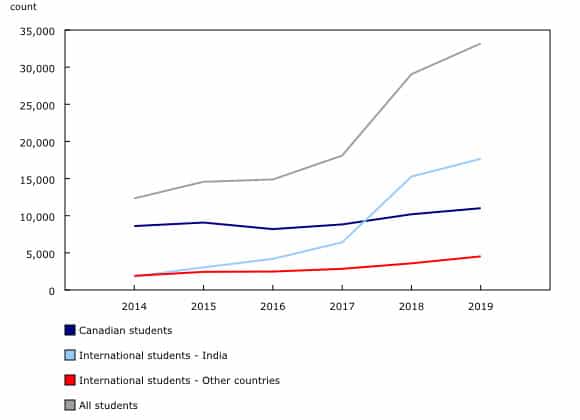Indian students driving enrolment growth in postgraduate programmes for Canadian colleges
- A new analysis highlights that Indian students are heavily represented in postgraduate programmes offered by Canadian colleges and institutes, and that Indian students are largely driving enrolment growth in this programme category
- The vast majority of Indian graduates of postgraduate college programmes go on to obtain permanent residency in Canada within five years of graduation
Demand for programmes offered by Canadian colleges and institutes was especially high last year: 57% of all applications processed by Immigration, Refugees and Citizenship Canada (IRCC) in 2021 were for colleges (a 5% increase over 2020), compared with 35% for universities (down 6% from 2020). The 280,600 college-related applications processed by IRCC in 2021 represent a 114% increase over the past five years.
Of the 286,400 study permits that IRCC approved in 2021 for all programmes, 52% were for applicants to college programmes, illustrating the increasingly important role that colleges are playing in the growth of Canada’s international education sector.
A new analysis from Statistics Canada points out that this trend really began around 2017, and that there are two underlying factors. First, surging enrolments from Indian students are driving a significant proportion of that overall growth. Second, Indian students are especially heavily represented in postgraduate programmes offered by Canadian colleges and institutes.
The big picture
The number of Indian students in Canada has ballooned over the past decade, rising nearly ten-fold from just over 27,000 in 2011 to nearly 220,000 by the end of last year.
Meanwhile, reports Statistics Canada (StatsCan), "College postgraduate credential programmes —typically requiring a previous postsecondary credential as a prerequisite for entry and aimed at providing career-specific skills — have grown in popularity, accounting for 13% of all college graduations in 2019, more than double the share (6%) recorded five years before in 2014."
Graduations with college postgraduate credentials more than doubled between 2014 and 2019, to reach just over 33,000 credentials awarded by the end of that period. Also by 2019, more than half of those graduates (53%) were from India.
StatsCan adds, "This is a unique phenomenon among all postsecondary programs, as a minority of graduates from other programs were Indian international students. For instance, Indian students made up 12% of graduates from non-postgraduate college certificates and diplomas, the credential with the next-highest share of Indian graduates."

The link to permanent residency
The StatsCan data also clearly establishes that many students completing a postgraduate qualification went on to secure permanent residency in Canada. Indeed, through 2019, eight in ten foreign graduates of postgraduate college programmes obtained permanent residency within five years of graduation.
"This compares to 71% for those who completed a non-postgraduate college certificate or diploma, 69% with a master's degree, and 50% with a bachelor's degree," says StatsCan. "Permanent residency rates of Indian international students were above 80% for all four of these credential types, with the rate being highest among Indian students with a college postgraduate credential (85%). Among international students from countries other than India, permanent residency rates were lower than those of Indian international students, and they also varied between credentials. They were highest among those with a college postgraduate credential (74%) and lowest among those with a bachelor's degree (49%)."
For additional background, please see:


















